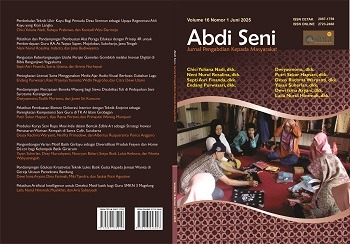PELATIHAN DAN PENDAMPINGAN PEMBUATAN ALAT PERAGA EDUKASI DENGAN PRINSIP 4R UNTUK PEMBERDAYAAN GURU RA AT TAQWA SAPEN, MOJOLABAN, SUKOHARJO, JAWA TENGAH Alat Peraga Edukasi
Main Article Content
Abstract
The Art-related Community Service Program at the kindergarten of Raudhatul Athfal At-Taqwa (RA At-Taqwa) aims to foster creativity in artwork creation and improve the skills and competencies of RA teachers in utilizing waste as materials for making Educational Teaching Aids/Games (APE). This approach carries the concept of safety for children, which is environmentally friendly, sourced from materials that are easily obtained from the surrounding environment, with low manufacturing costs, and the application of the 4R principle (Reduce, Reuse, Recycle, Replace). The implementation method includes training, mentoring, and demonstrations to RA At-Taqwa teachers. The implementation strategy goes through Participatory Action Research (PAR) emphasizing empowerment, where teachers are encouraged to increase their creativity in utilizing used materials as an alternative for making APE. This program is also expected to have a positive impact on the school environment by reducing the amount of waste produced and increasing awareness of the importance of maintaining cleanliness and environmental sustainability. The problem faced by partners is the lack of utilization of children's creative potential in the learning process. The limited use of APE has not optimally developed children's creative potential. This shows that there is still a gap between the potential of children's creativity and the use of available resources in learning. Thus, training and mentoring on the use of used goods is one solution as a means to stimulate and develop children's creativity in the teaching and learning process.
Downloads
Article Details

This work is licensed under a Creative Commons Attribution-ShareAlike 4.0 International License.
License and Copyright Agreement
In submitting the manuscript to the journal, the authors certify that:
- Their co-authors authorize them to enter into these arrangements.
- The work described has not been formally published before, except as an abstract or part of a published lecture, review, thesis, or overlay journal. Please also carefully read Abdi Seni's Posting Your Article Policy at https://jurnal.isi-ska.ac.id/index.php/abdiseni/about/editorialPolicies#peerReviewProcess
- That it is not under consideration for publication elsewhere,
- That its publication has been approved by all the author(s) and by the responsible authorities – tacitly or explicitly – of the institutes where the work has been carried out.
- They secure the right to reproduce any material already published or copyrighted elsewhere.
- They agree to the following license and copyright agreement.
Copyright
Authors who publish with Abdi Seni agree to the following terms:
- Authors retain copyright and grant the journal right of first publication with the work simultaneously licensed under a Creative Commons Attribution License (CC BY-SA 4.0) that allows others to share the work with an acknowledgment of the work's authorship and initial publication in this journal.
- Authors can enter into separate, additional contractual arrangements for the non-exclusive distribution of the journal's published version of the work (e.g., post it to an institutional repository or publish it in a book), with an acknowledgment of its initial publication in this journal.
- Authors are permitted and encouraged to post their work online (e.g., in institutional repositories or on their website) before and during the submission process, as it can lead to productive exchanges and earlier and greater citation of published work.
Licensing for Data Publication
Abdi Seni uses a variety of waivers and licenses that are specifically designed for and appropriate for the treatment of data:
- Open Data Commons Attribution License, http://www.opendatacommons.org/licenses/by/1.0/ (default)
- Creative Commons CC-Zero Waiver, http://creativecommons.org/publicdomain/zero/1.0/
- Open Data Commons Public Domain Dedication and Licence, http://www.opendatacommons.org/licenses/pddl/1-0/
Other data publishing licenses may be allowed as exceptions (subject to approval by the editor on a case-by-case basis). They should be justified with a written statement from the author, which will be published with the article.
Open Data and Software Publishing and Sharing
The journal strives to maximize the replicability of the research published in it. Authors are thus required to share all data, code, or protocols underlying the research reported in their articles. Exceptions are permitted but must be justified in a written public statement accompanying the article.
Datasets and software should be deposited and permanently archived in inappropriate, trusted, general, or domain-specific repositories (please consult http://service.re3data.org and/or software repositories such as GitHub, GitLab, Bioinformatics.org, or equivalent). The associated persistent identifiers (e.g., DOI or others) of the dataset(s) must be included in the article's data or software resources section. Reference(s) to datasets and software should also be included in the article's reference list with DOIs (where available). Where no domain-specific data repository exists, authors should deposit their datasets in a general repository such as ZENODO, Dryad, Dataverse, or others.
Small data may also be published as data files or packages supplementary to a research article. However, the authors should prefer a deposition in data repositories in all cases.
